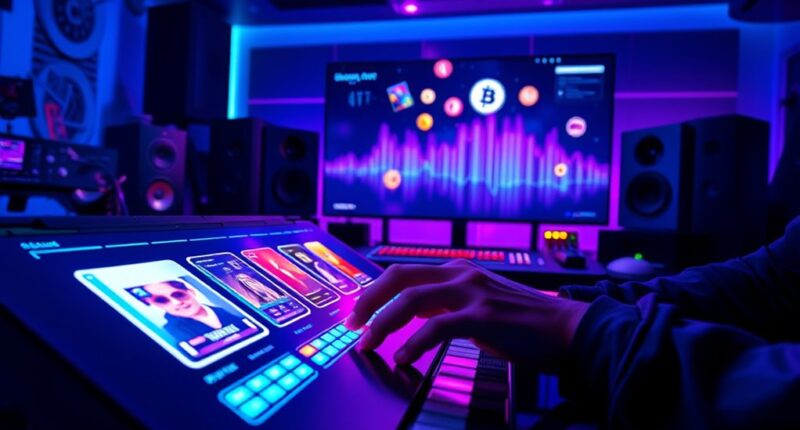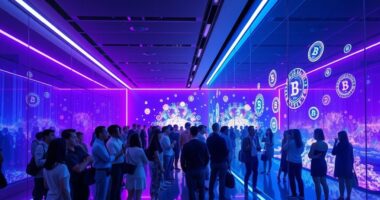Artists are using NFTs to create exclusive digital collectibles that strengthen your connection with them. They bundle these tokens with concert tickets, merchandise, and personalized experiences, giving you a sense of ownership and participation. NFTs also open new revenue streams for artists while offering transparency and authenticity through blockchain technology. By offering unique opportunities like private events or rare content, artists are transforming how they engage fans—exploring innovative ways to build loyalty. Keep exploring to discover more about this exciting digital frontier.
Key Takeaways
- Artists use NFTs to offer exclusive digital collectibles like artwork, videos, and rare recordings, strengthening fan connection.
- Limited-edition NFTs create scarcity, boosting engagement through auctions, bidding, and unique ownership experiences.
- NFTs enable artists to bundle digital assets with tickets or merchandise, enhancing marketing and revenue streams.
- Ownership of NFTs fosters stronger emotional bonds, loyalty, and active participation in fan communities.
- Blockchain guarantees authenticity and transparency, building trust and offering innovative, participatory fan experiences.

NFTs have revolutionized how artists sell and share their music, offering new ways to connect with fans and monetize their work. One of the most exciting developments is the creation of digital collectibles that go beyond traditional music formats. Instead of just streaming tracks or buying albums, fans now have the opportunity to own unique digital assets linked to their favorite artists. These collectibles can include limited-edition artwork, exclusive behind-the-scenes videos, or rare concert recordings, all secured on the blockchain. As a fan, you get to own a piece of the artist’s universe, which can deepen your connection and sense of exclusivity. For artists, these digital collectibles open up fresh revenue streams, allowing you to monetize your creativity in ways that weren’t possible before. When you offer limited-edition NFTs, your fans feel more engaged because they’re part of something special and tangible in the digital space. This approach transforms passive listeners into active participants, fostering a stronger sense of community and loyalty.
Fan engagement becomes more dynamic when you leverage NFTs as interactive tools. For example, you can release a series of limited NFTs that access private concerts, meet-and-greets, or personalized messages. These exclusive experiences make your fans feel appreciated and closer to your journey. By using blockchain technology, you guarantee transparency and authenticity, which increases trust and desirability for your digital collectibles. As a result, your fans are more likely to share their ownership online, creating a ripple effect that amplifies your reach. You can also host events or auctions where fans bid for rare tokens, making the process more participatory and exciting. This level of interaction is impossible with traditional music sales and helps you build a more dedicated fanbase, one that feels invested in your success.
Incorporating NFTs into your music career allows you to experiment with innovative marketing strategies. You could bundle digital collectibles with concert tickets or merchandise, offering fans a multi-layered experience. These strategies not only boost your income but also create a more meaningful connection with your audience. Ultimately, NFTs give you control over how you distribute and monetize your music and related content, assuring you benefit directly from your creativity. By embracing this technology, you’re not just selling music; you’re creating a new form of fan engagement that is more personal, exclusive, and rewarding for both sides. This shift is transforming how artists and fans interact, making your music career more dynamic and financially sustainable in the digital age.
Frequently Asked Questions
How Do NFTS Impact Artists’ Revenue Streams Long-Term?
NFTs can positively impact your long-term revenue streams by establishing new royalty structures and digital ownership models. When you sell an NFT, you often set up ongoing royalties, ensuring you earn from secondary sales. This shifts traditional income sources, giving you more control and potential for sustained earnings. By leveraging these innovative approaches, you can grow your revenue streams and strengthen your connection with fans over time.
What Legal Issues Are Associated With Music NFTS?
A stitch in time saves nine, and that’s true for music NFTs too. You face legal issues like protecting your intellectual property rights and ensuring contractual obligations are clear. When creating or selling NFTs, you risk copyright infringement or misusing someone else’s work. You must carefully navigate licensing, ownership rights, and smart contracts to avoid legal trouble, keeping your rights protected and your creative assets secure.
Can NFTS Help Emerging Artists Gain Recognition?
Yes, NFTs can help emerging artists gain recognition by providing digital exposure and boosting fan engagement. When you release NFTs, you create unique digital assets that attract attention and showcase your talent to a wider audience. Fans become more involved, sharing and promoting your work. This direct interaction helps you stand out in a crowded industry, build a loyal community, and ultimately accelerate your career growth.
How Do Fans Verify the Authenticity of Music NFTS?
You can verify the authenticity of music NFTs by checking digital signatures embedded within the token. These signatures confirm the creator’s identity and ownership. Additionally, blockchain verification allows you to trace the NFT’s history, ensuring it hasn’t been tampered with or duplicated. By using trusted platforms, you can easily access this verification process, giving you confidence that your music NFT is genuine and legitimately owned by the artist.
What Are Environmental Concerns Related to NFTS in Music?
Ironically, while you might think NFTs are all about innovation, they raise real environmental concerns. You might not realize it, but the high energy consumption needed for blockchain transactions substantially increases the carbon footprint. This means that each music NFT you buy could be contributing more to climate change than you’d expect. The environmental cost is often overlooked, but it’s a vital factor in evaluating the true impact of NFTs.
Conclusion
As you explore how artists use NFTs to connect with fans, it’s no surprise that these digital tokens are changing the game. Coincidentally, just as musicians embrace this new tech, fans find themselves more engaged than ever, creating a cycle of innovation and community. It’s almost like the universe is aligning for a new era of music—a perfect blend of art, technology, and connection that keeps everyone enthusiastic to see what’s next.









